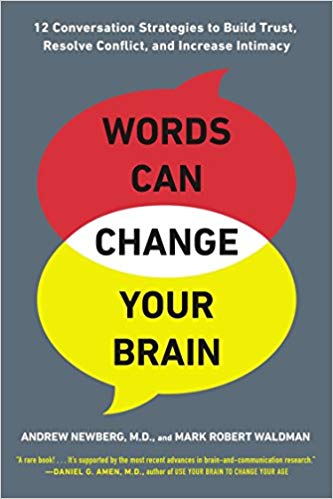 Words Can Change Your Brain: 12 Conversation Strategies to Build Trust, Resolve Conflict, and Increase Intimacy by Andrew Newberg is absolutely amazing with the amount of research it has about the brain. Newberg has an approach he calls “compassion communication” with 12 steps. For example, our conscious mind can only hold about four “chunks” of information in working memory, and it can only hold those chunks for about 30 seconds. When possible, it is advisable to limit speaking time to 20–30 seconds.
Words Can Change Your Brain: 12 Conversation Strategies to Build Trust, Resolve Conflict, and Increase Intimacy by Andrew Newberg is absolutely amazing with the amount of research it has about the brain. Newberg has an approach he calls “compassion communication” with 12 steps. For example, our conscious mind can only hold about four “chunks” of information in working memory, and it can only hold those chunks for about 30 seconds. When possible, it is advisable to limit speaking time to 20–30 seconds.
Even the slightest degree of stress or negativity on the part of the speaker increases negativity in both the listener and the speaker. Anger in the brain interferes with memory storage and cognitive accuracy. This means the advice that one should express their anger actually increases anger in not only the speaker but in the listener as well.
What fascinates me is the increase in research about compassion and its incredible benefits for the brain and for life. Words Can Change Your Brain is another source with excellent brain research to support the use of compassion.
An article from The Atlantic titled “Can We Touch?” discusses how touch is so incredibly important to humans. The Journal of Pediatrics reported research that indicated that just 10 days of stroking babies’ bodies for less than an hour a day caused the babies to grow 47% faster. Without touch for babies, there is both physical and cognitive impairment. Hugs are VERY IMPORTANT to good health.
Increasingly, as the article states, touching is less and less acceptable—particularly because of all the issues around inappropriate touch. The author notes that for touch to be okay today, one needs to make sure that it is “not unwanted, unexpected, or unpredictable.”
Take a deep dive into these topics and more in my latest book, Emotional Poverty in all Demographics: How to Reduce Anger, Anxiety, and Violence in the Classroom.








